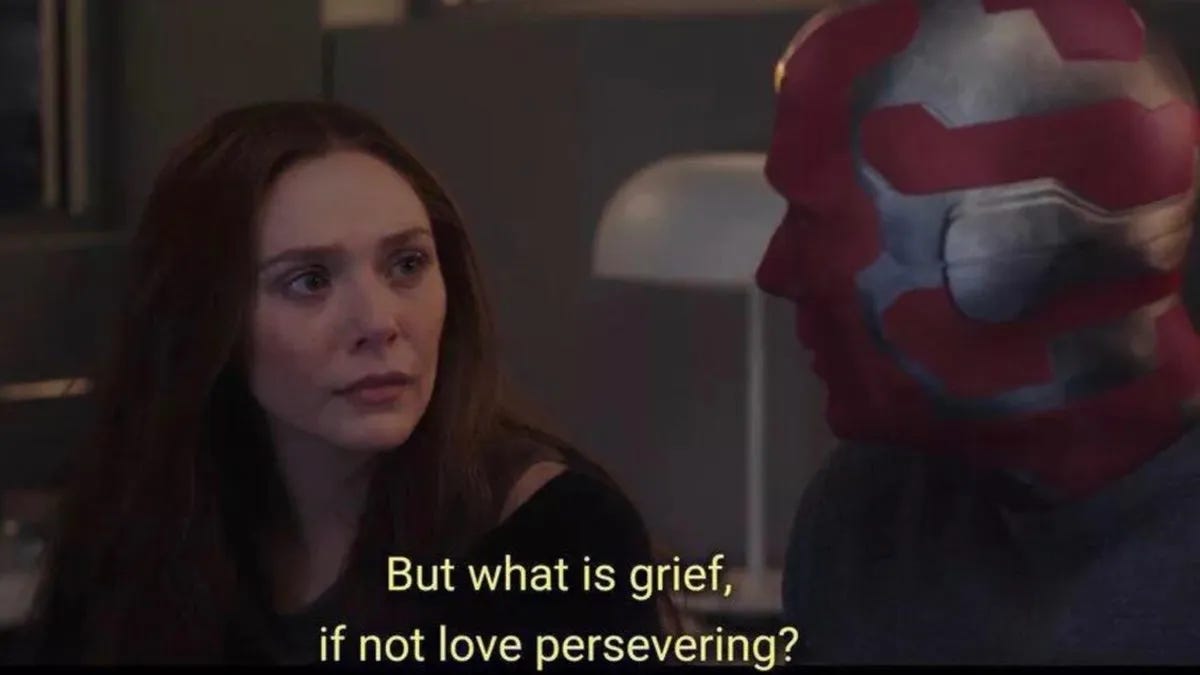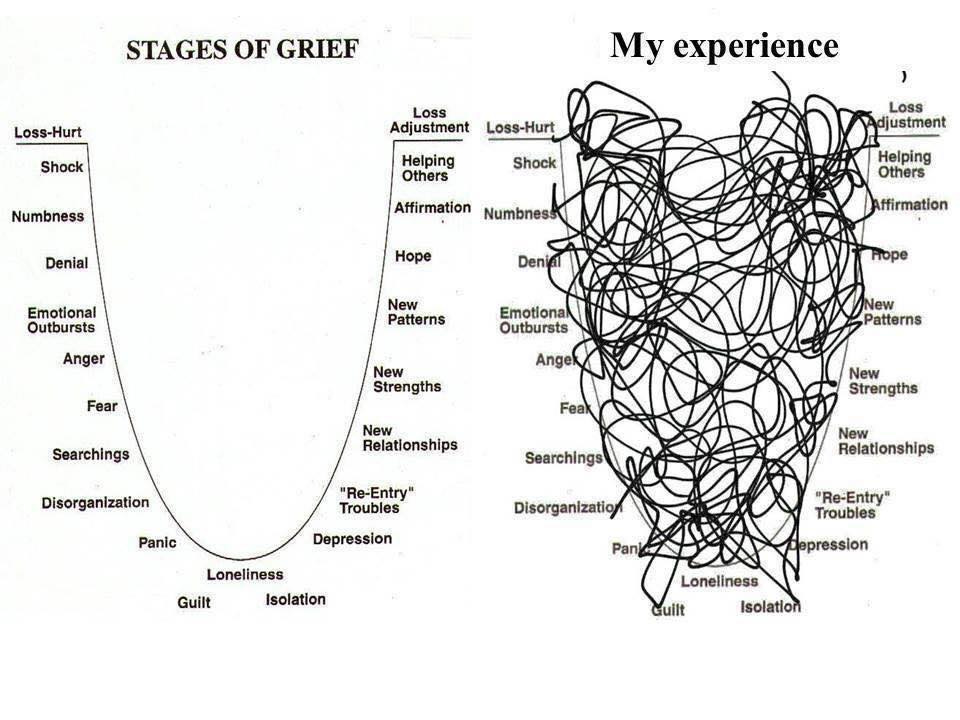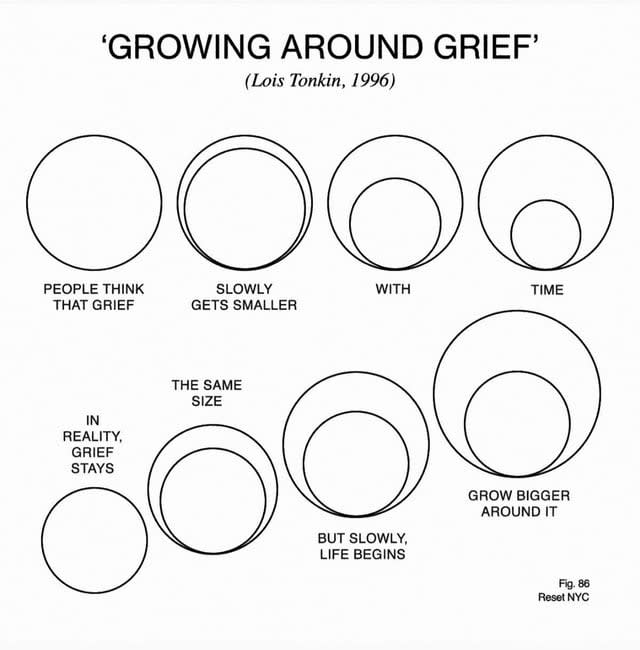grief & love cycles (how we show up)
musings on loss, witnessing injustice, and honoring how hard it is to move through grief.
It’s my favorite time of the year. Pride month and Gemini season both now are coming to a close1 and summer is in full swing. In addition to being a summer baby, both of my parents happen to be from hot climates. Naturally, I’ve inherited from them an adoration for summertime, in which the sun’s warmth feels like home. Here in Chicago, we gruel through the difficult months of winter to emerge from our hibernation born anew, ready to reconnect with loved ones who we haven’t seen in months. These are the days with the most lively memories for me, the days which hold the most joy. I’ve always associated summer with an abundance and infinite possibility2. But today I write to you at the beginning of a somber summer: one that’s informed by a world on fire and waves of violence & loss that have been difficult to process for myself and many around the world.
I just lost a dear friend recently. I’m sure that one day, I will feel ready to openly and publicly remind the world of how special she was and all that I learned from her. But that day isn’t today, and this piece is not an obituary. Yet, I can’t not talk about the difficulty of what it means to move through grief. After all, its very nature is one that cuts through all of life’s plans, expectations, and dreams. Life suddenly feels on pause. It’s important to honor this grief work because it affects how I’m thinking, how I’m moving through the world, and *especially* how I’m struggling to write.
Of what I’ve learned of writing lately, I find it to be a practice of major responsibility. It always requires a level of commitment to complete honesty about who I am (and how that changes), what I’m witnessing in the world around me, and how I’m moving through it as a consequence. This practice can be all-consuming at times, which I think is why it’s important to pause at times to take stock and listen.
In times like these — characterized by the horrors we’re witnessing in the Congo, in Palestine, in Sudan – it can feel like escapism when I turn to write about anything other than the genocide and apartheid we are witnessing around us and in the world. The difficulty I’ve had stomaching this violence has caused me to pause. The recent growth of islamophobia and anti-Muslim sentiment in the West has returned us to a post-9/11 world where the political zeitgeist is characterized by fear and a growing right-wing nationalism that seeks to further benefit the West’s imperialist & economic conquest of the Middle East. It feels folly at times for us to sit and talk about pop culture and entertainment when we should be disrupting these agendas and oppressive systems in whatever ways needed.
I’ve pondered a lot about escapism lately, both fondly and critically. Lately escapism feels cowardly, like dissociation. I don’t mean for that to sound harsh or like a reactive diss. If you know me, you know that I play a lot of video games, I read a lot of comics, and out of anyone, I should know that doses of escapism are necessary for our spirits – if not to regulate our nervous systems, then to dream of better worlds, better futures. Yet I struggle to carry my grief with me. These days, I feel that when I take a moment to escape, it feels like I’m letting others down. I’m not sure if this is completely fair, but this is how I’m showing up lately.

One of my first run-ins with grief came when I lost a parent at a young age – perhaps too young. It feels impossible to fathom what losing someone means in our world when you’re ten years of age. I fully embraced the delusion that I was stuck in an ongoing dream that, in several months, I would wake up from. Nothing was real around me for those first couple of years after my farther’s passing, until one day it became clear that there was no returning to ‘normalcy’. This was my life and my parent was gone. From loss comes a lot of change and fear. You no longer feel like who you once knew yourself to be, you’re afraid of being seen in this state of ‘broken-ness’. The world feels uglier and lonelier without our loved ones in it. We’re riddled with that fear of a life without them and the uncertainty of not knowing if we’re strong enough to continue on ‘alone’. To move with these feelings of grief is to sit with the tattered and broken pieces of who you once were to reconfigure who you can be now in a world shaped differently by this loss.
However, if there’s anything I learned in my early encounters with loss, it’s that there’s no clear-set path to recovering from losing a loved one. I mean, for some, understanding the stages of grief (i.e. Denial, Anger, Bargaining, Depression, and Acceptance, etc.) can be super helpful as a tool. For me though, I’ve always found the process of grieving to be too nonlinear to be captured by this framework. I hate to admit it, but there are losses that I moved on from after a short period of days. There are losses that I never took time to grieve, that caught up with me several years later. And there are losses that I continue to carry with me every year, every day, every moment. We are complex humans, with complex memories, and grief is nothing if not a testament to our multifaceted love.

And yet, this work is painful, difficult to move through. It is necessary to take breaks from it, to find comfort and joy in our loved ones who are still with us, even in time alone. But I urge us all to consider the importance of being present and to move carefully through dissociation. By dissociating ourselves from the pain we feel from grief, we run the risk of forgetting them and distancing ourselves from the memories that made them so special to us. We keep our loved ones alive through the ways they’ve touched us, molded us, shaped us to move through the world with our hearts tethered to one another. (Have y’all not seen Coco?)
It amazes me how much time it takes to steward life. I am forever in awe of the work that goes into caring for children, animals, or even plantlife. In building families, architecture, ecosystems, communities, art – it can take years, ages, eons. And it startles me how quickly it can all be taken away through violence or destruction or chaos. Perhaps this is a reminder of the sacredness of life and the gift of creation. Maybe this reminder is exactly why, in the face of loss, we continue on and are called to choose to love and open our hearts once again.
Each time I lose someone, what stands out to me the most is how time moves differently. In ‘grief time’, time will never seem to be on your side. I notice huge losses of time, perhaps due to periods of dissociation and spending so much time in my thoughts and my feelings. Part of the pain of losing someone is realizing that there are no more memories to be made together3. For our lost ones, our memories of them are frozen in time. Yet the world will keep turning, urging us to put down our grief and move with it. What an agonizing task.
You may not be a spiritual person, but I personally do believe that our spirits are still felt after our departure from this plane of existence. When our loved ones leave us, their presence will leave a void in our life and our hearts. This void never shrinks. It is always kept alive by the love bestowed upon us by their spirits. The grief we feel also doesn’t shrink with time. Rather, we continue to grow around it, as we heal and invite more change, more love, more joy, and more possibilities into our lives.
Even when we take the time we need, it never will feel like there’s enough time to fully process the pain of losing someone special. Truthfully, I’ve learned that part of loving others means we’ll never fully reach a point of full recovery in mourning. Because life happens, grief will continue to wash over us, again and again as we go through life. This is a consequence of loving others, a part of the cycle of love. To love is to grieve, because everything around us will one day come to an end. An uncomfortable but ultimate truth. It is a reminder that all life is temporary and that one day, we will leave this earth for another destiny, and those left behind will inherit our memories together and the love we shared. If there is any takeaway to grief, let it be that this anguish we go through in losing someone is to honor them as a teacher in love and life, in hopes that in due time, we can share what they’ve taught us about ourselves and the world we live in so that their love (and ours) can be preserved and shared with the universe once again.
Yes, I am a gemini. I’m sorry and you’re welcome.
I know many folks who would blatantly disagree with me. The heat can be oppressive to so many folks. #SummertimeSadness is also a vibe, though. If this is one of you, I see you. Stay near your fan, stay near your AC. We will rebuild.
This is an incomplete thought. While our memories of our lost loved ones are locked when they physically leave this Earth, through remembering them, we can make more memories with them. Though it will never feel the same without them, it is a vital reminder that we’re never truly alone in the ways we think.





Beautiful reflection!!
🥲Thanks for writing. I'm sorry to hear about your loss and appreciate you sharing. As a fellow summer baby, I hope you have a lovely summer and lean on your support system. Very much relate with losing a parent at 10, that's when I lost my mom. I've had a couple dreams, where I feel the weight of grief lifted only to wake up and become aware of the weight I carry, that I have just grown used to. I have also dreamed that she's always been alive and just didn't want to see me. I remind myself this is directly countered by all the love she gave me and it reminds me how much she would love me if she were here. Thinking of all the hard work healing takes it's so hard to fathom the major losses happening on such massive scales in Palestine, Sudan, and the Congo and how it will affect generations. Thank you for writing, Caitlin <3